If you're looking for gentle herbal tea blends to aid digestion, try combining peppermint and ginger. Both relax your gastrointestinal muscles and stimulate digestive enzymes. Chamomile and fennel can also be soothing, alleviating bloating and discomfort after meals. For added sweetness, licorice root helps with indigestion while dandelion root supports liver health. For a revitalizing twist, mix lemon balm and anise to calm your stomach. Finally, rooibos and turmeric offer a nourishing option against inflammation. Each blend can be customized to your taste. There's plenty more to explore in the world of herbal remedies for digestive health.
Peppermint and Ginger Harmony
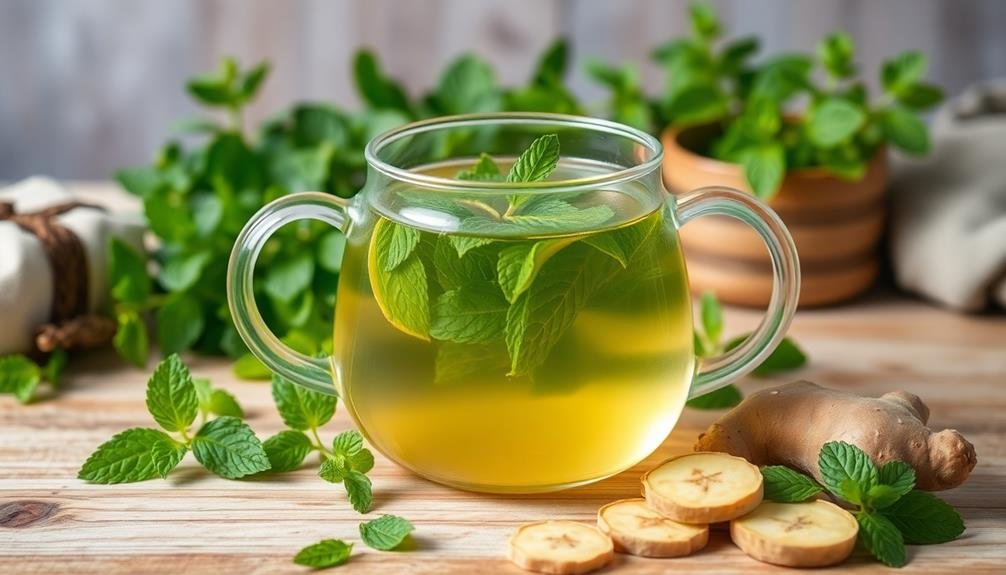
Peppermint and ginger make a powerful duo when it comes to promoting digestive health. When you brew a cup of this herbal tea blend, you're not just enjoying a soothing drink; you're also giving your digestive system a much-needed boost.
Peppermint, with its invigorating flavor, helps relax the muscles of your gastrointestinal tract, making it easier for gas and bloating to dissipate. You'll often find that sipping peppermint tea can provide relief from uncomfortable stomach cramps.
On the other hand, ginger is renowned for its ability to ward off nausea and stimulate digestion. By incorporating ginger into your tea, you're enhancing its effectiveness, as it promotes healthy enzyme production and can ease symptoms of indigestion.
Together, these two herbs create a harmonious balance that not only tastes great but also supports your body's natural processes.
To make this blend, simply steep fresh peppermint leaves and ginger slices in hot water for several minutes. You can sweeten it with honey if you'd like.
Enjoy this comforting tea after meals, and you may find that it helps your digestion feel smoother and more pleasant overall.
Chamomile and Fennel Fusion
Chamomile and fennel make a soothing combination that can really benefit your digestion.
Chamomile helps calm your stomach and reduce bloating, while fennel promotes healthy digestion and eases gas.
Together, they create a gentle yet effective blend that you might find comforting after meals.
Benefits of Chamomile
A soothing cup of chamomile tea can work wonders for your digestive health, especially when blended with fennel. Chamomile is renowned for its calming properties, making it an excellent choice for anyone dealing with digestive discomfort.
When you sip on chamomile tea, you're not just enjoying a warm beverage; you're also helping to ease gastrointestinal cramps and bloating. Chamomile contains anti-inflammatory compounds that can relax the muscles of your gastrointestinal tract. This relaxation can lead to a more comfortable digestive experience, allowing food to move smoothly through your system.
Additionally, chamomile's mild sedative effects can help reduce stress and anxiety, which are often contributors to digestive issues. Moreover, drinking chamomile tea before meals may enhance your appetite and aid in digestion.
Its gentle flavor makes it an enjoyable option for those who might be sensitive to stronger herbal teas. So, when you combine chamomile with fennel, you're creating a powerful duo that supports your digestive health while offering a delightful taste.
Next time you feel the need for a digestive boost, reach for a cup of chamomile and fennel fusion, and let its benefits unfold.
Fennel's Digestive Properties
Fennel seeds, with their sweet, anise-like flavor, offer remarkable digestive benefits that complement chamomile beautifully in a soothing tea blend. When you sip on this fusion, you're not just enjoying a pleasant taste; you're also promoting better digestion.
Fennel is known for its ability to relieve bloating and gas, making it an excellent choice for those uncomfortable after meals. The essential oils in fennel, particularly anethole, help relax the gastrointestinal muscles, easing cramping and discomfort. This makes it ideal for anyone who frequently experiences digestive issues.
Plus, the combination of chamomile and fennel creates a calming effect, which can further help reduce stress-related digestive problems. Drinking this herbal tea after meals can support your body's natural digestive processes, allowing you to feel lighter and more comfortable.
It's also a great way to encourage healthy digestion throughout the day. Whether you're winding down in the evening or looking for relief after lunch, this chamomile and fennel blend can be your go-to remedy. So, brew a cup and let these gentle herbs work together to soothe your digestive system!
Licorice Root Soothing Blend
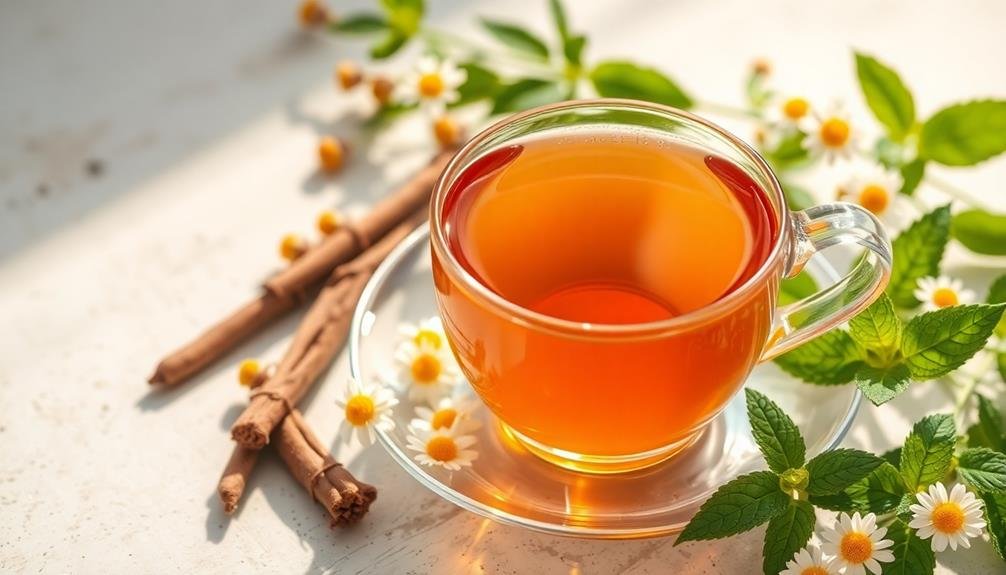
Licorice root is a powerhouse for soothing your digestive system, offering several benefits that you'll love.
When you're ready to prepare this blend, it's simple and quick, ensuring a delicious cup every time.
Let's explore the ideal serving suggestions to make the most of this calming tea.
Benefits of Licorice Root
Have you ever wondered how a simple herb can provide comfort for your digestive woes? Licorice root is a powerhouse when it comes to soothing your stomach and promoting overall digestive health. Its natural properties can help alleviate symptoms like bloating and indigestion, making it a popular choice among herbal remedies.
One of the key benefits of licorice root lies in its ability to reduce inflammation in the gastrointestinal tract. This can help create a more balanced environment, allowing your digestive system to function effectively.
Additionally, licorice root contains compounds that may enhance mucus production, which protects your digestive lining from irritants and promotes healing.
Moreover, licorice root can aid in regulating stomach acid levels. By balancing acid production, it can prevent discomfort caused by acid reflux and heartburn.
Plus, its mild sweetness makes it a delightful addition to your herbal tea blend.
Incorporating licorice root into your routine can provide not just relief but also a sense of comfort. Embrace this gentle herb, and enjoy the soothing effects it brings to your digestive health.
Preparing the Blend
Creating a soothing herbal tea blend can transform your digestive routine. The Licorice Root Soothing Blend combines the gentle flavors and benefits of licorice root with other supportive herbs to create a calming experience.
Here's how you can prepare this delightful blend at home:
- Gather Your Ingredients: You'll need dried licorice root, chamomile flowers, and fennel seeds. Each of these ingredients contributes to digestive health, providing a sweet, floral, and slightly spicy flavor profile.
- Measure the Ratios: For a balanced blend, use 2 parts licorice root, 1 part chamomile, and 1 part fennel seeds. Adjust these ratios based on your taste preferences, but keep licorice root as the base since it's the star of this blend.
- Mix and Store: Combine the herbs in a dry, airtight container. Store your blend in a cool, dark place to preserve its freshness.
When you're ready to brew a cup, use one tablespoon of the blend for every 8 ounces of boiling water.
Ideal Serving Suggestions
Once you've prepared your Licorice Root Soothing Blend, it's time to enjoy it to its fullest potential. Start by serving it in your favorite mug to enhance the experience. The warmth of the cup adds comfort, making each sip more enjoyable.
You might consider adding a slice of fresh lemon or a drizzle of honey to elevate the flavor. Both options complement the natural sweetness of licorice root while providing additional health benefits.
For the best results, sip your tea slowly. This gives your body time to absorb the soothing properties, helping with digestion. Pair your tea with a light snack, like whole-grain crackers or a small piece of fruit, to create a balanced moment for your stomach.
It's also a good idea to enjoy this blend in a calm, relaxing environment. Find a cozy nook in your home, dim the lights, and take a few deep breaths before you immerse yourself.
This mindful approach will maximize the calming effects of your tea. Remember, the goal is to savor the experience and allow your body to reap the benefits of this gentle herbal infusion.
Lemon Balm and Anise Mix
If you're looking for a soothing herbal blend to support your digestive health, the combination of lemon balm and anise is a delightful choice. This mix not only tastes great, but it also offers a range of benefits that can help ease digestive discomfort.
Lemon balm is known for its calming properties, while anise adds a sweet, licorice-like flavor that enhances the overall experience.
Here are three key reasons to try this herbal blend:
- Digestive Aid: Anise is traditionally used to relieve bloating and gas, making it an excellent companion to lemon balm, which helps reduce stress and tension in the digestive tract.
- Relaxation: Lemon balm promotes relaxation and can help calm your mind, making it easier to enjoy your tea and aid digestion after meals.
- Flavorful Experience: The unique blend of lemon balm and anise creates a revitalizing taste that can be enjoyed hot or iced, making it a versatile addition to your herbal tea collection.
Rooibos and Turmeric Delight
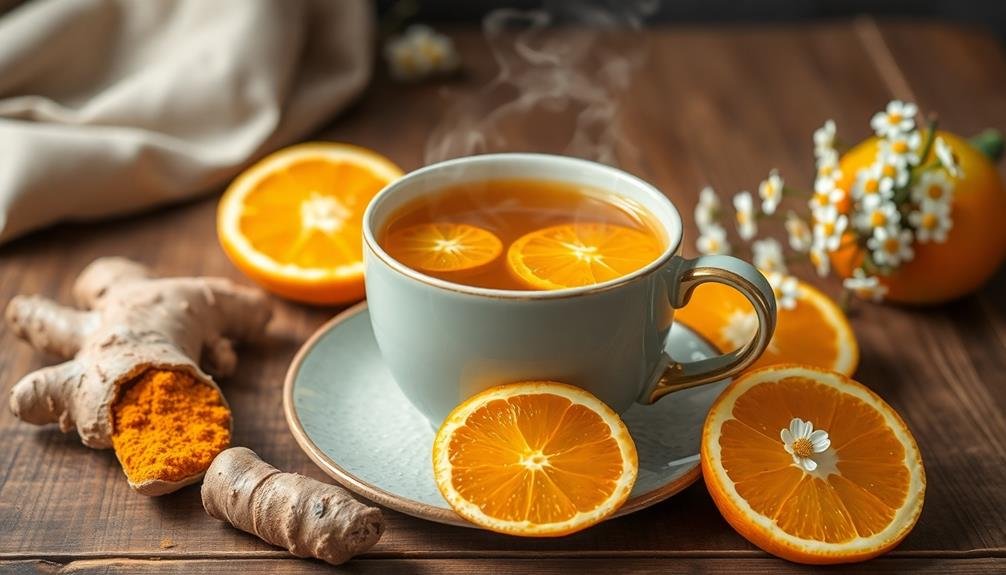
Rooibos tea is packed with antioxidants that can help soothe your digestive system, making it a great choice for your wellness routine.
When you combine it with turmeric, known for its anti-inflammatory properties, you create a powerful blend that supports digestion.
Let's explore how to brew this delightful mix to maximize its benefits.
Benefits of Rooibos Tea
A delightful cup of Rooibos tea infused with turmeric offers a range of benefits that can support your digestive health. This naturally caffeine-free herbal tea isn't only soothing but also packed with nutrients that can enhance your overall well-being.
Here are three key benefits of Rooibos tea:
- Rich in Antioxidants: Rooibos is loaded with antioxidants like aspalathin and nothofagin, which help combat oxidative stress and may promote a healthier digestive system.
- Anti-inflammatory Properties: The anti-inflammatory compounds in Rooibos can help reduce inflammation in your gut, contributing to a more comfortable digestive experience.
- Supports Hydration: Staying hydrated is essential for digestion, and Rooibos tea is an excellent way to keep your fluid intake up without caffeine, helping to maintain regular bowel movements.
Incorporating Rooibos tea into your daily routine can be a delicious way to support your digestive health.
Whether enjoyed alone or blended with other herbs, you'll appreciate the calming effects it brings to your day.
Turmeric's Digestive Properties
Blending Rooibos tea with turmeric creates a powerful combination that enhances digestive health. Turmeric, known for its vibrant yellow color, contains curcumin, a compound celebrated for its anti-inflammatory and antioxidant properties.
When you sip on this delightful blend, you're not just enjoying a soothing drink; you're also giving your digestive system a boost. Curcumin aids digestion by stimulating bile production, which is essential for breaking down fats. This can help alleviate bloating and promote a smoother digestive process.
Additionally, turmeric's antimicrobial qualities can combat gut bacteria and support overall gut health. With Rooibos tea's natural sweetness and caffeine-free nature, you'll find this blend to be both nourishing and calming.
Regularly consuming Rooibos and turmeric can also help reduce inflammation in the gut, making it a great option for those with digestive issues. Plus, this herbal combination can ease discomfort from indigestion and promote regularity.
Brewing the Perfect Blend
To brew the perfect Rooibos and turmeric delight, start by gathering your ingredients: high-quality Rooibos tea, fresh turmeric or turmeric powder, and hot water. This blend not only tastes great but also aids digestion. Here's how to make it:
- Measure: Use one teaspoon of Rooibos tea and half a teaspoon of turmeric. If you're using fresh turmeric, slice it thinly to release its flavor.
- Heat: Bring your water to a rolling boil, about 200°F (93°C). Pour it over the Rooibos and turmeric in a teapot or infuser.
- Steep: Let the mixture steep for 5-7 minutes. This allows the flavors to meld beautifully, giving you a rich, aromatic tea.
Once it's done steeping, strain the tea into your favorite mug. You can sweeten it with honey or add a splash of lemon for an extra zing.
Enjoy your Rooibos and turmeric delight warm, and feel the soothing effects on your digestion. This simple yet effective brew is perfect for any time of day, helping you relax while nurturing your body.
Dandelion and Nettle Brew
Herbal enthusiasts often turn to the invigorating Dandelion and Nettle Brew when seeking relief for digestive discomfort. This blend combines the benefits of both dandelion and nettle, making it a powerful ally for your gut health.
Dandelion root is known for its ability to stimulate liver function and promote bile production, which can help break down fats and improve digestion. On the other hand, nettle leaves are packed with nutrients and have anti-inflammatory properties that can soothe your digestive tract.
To prepare this herbal brew, simply steep a tablespoon of dried dandelion root and a tablespoon of dried nettle leaves in hot water for about 10 to 15 minutes. You can adjust the steeping time based on how strong you like your tea.
Once it's ready, strain the herbs, and enjoy your brew warm. You might add a touch of honey or lemon for extra flavor if you like.
Drinking Dandelion and Nettle Brew regularly can't only help ease occasional digestive issues but also support overall digestive health.
Cinnamon and Clove Infusion
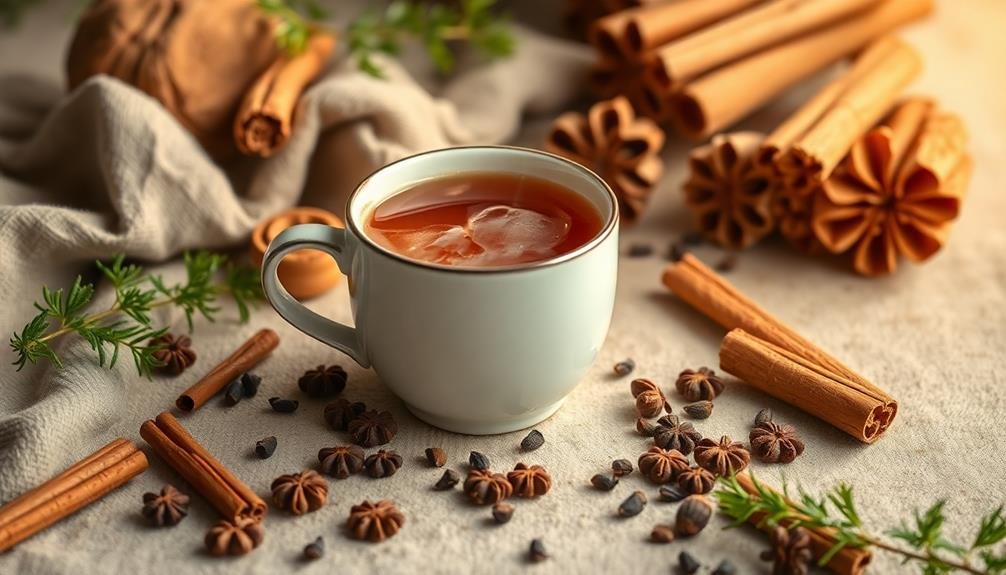
Cinnamon and clove's aromatic infusion offers a warm and comforting solution for digestive woes. This delightful blend not only tantalizes your taste buds but also supports your digestive system.
When you sip this infusion, you can experience a soothing effect that helps relieve discomfort and promote overall well-being.
Here are three benefits you can enjoy from this herbal infusion:
- Digestive Aid: Cinnamon and clove can help alleviate bloating and gas, making your tummy feel more at ease.
- Anti-Inflammatory Properties: Both spices possess natural anti-inflammatory qualities, which may aid in reducing irritation in your digestive tract.
- Antimicrobial Benefits: The properties found in cinnamon and clove can help combat harmful bacteria, supporting a healthier gut environment.
To prepare your infusion, steep a teaspoon of cinnamon and clove in boiling water for about 10 minutes.
Add a touch of honey for sweetness, if desired. As you sip this comforting brew, you'll appreciate the nurturing effects it has on your digestion, making it a perfect addition to your herbal tea repertoire.
Herbal Digestive Powerhouse
For anyone seeking a natural boost to their digestive health, exploring herbal remedies can be incredibly rewarding. You'll find that certain herbs act as powerful allies in promoting digestion and alleviating discomfort.
For instance, peppermint is well-known for its ability to relax the muscles of the gastrointestinal tract, easing bloating and gas. If you're feeling sluggish after a meal, sipping on peppermint tea can provide quick relief.
Ginger is another fantastic choice. It stimulates digestion and can help reduce nausea. A simple ginger tea, made with fresh slices, can work wonders for your stomach.
Fennel seeds also deserve a mention; they're excellent for reducing bloating and aiding overall digestive function. You can chew on the seeds after meals or brew them into a soothing tea.
Chamomile, often recognized for its calming properties, also supports digestion. It can help reduce indigestion and soothe the stomach lining.
Incorporating these herbal powerhouses into your daily routine can lead to noticeable improvements in your digestive health. Experiment with different blends to find what works best for you, and enjoy the soothing effects of nature's remedies.
Thyme and Sage Combination

While many herbs can support digestion, the combination of thyme and sage offers unique benefits worth exploring. These two herbs complement each other beautifully, creating a soothing blend that can ease digestive discomfort and promote overall gut health.
- Antimicrobial Properties: Both thyme and sage are known for their antimicrobial effects. This means they can help combat harmful bacteria in your digestive system, reducing the risk of infections and promoting a healthier gut environment.
- Anti-inflammatory Benefits: These herbs contain compounds that may help reduce inflammation in your digestive tract. This can be particularly beneficial if you often experience bloating or discomfort after meals.
- Relaxation and Stress Relief: Thyme and sage aren't just good for digestion; they also have calming effects. Sipping on a warm cup of thyme and sage tea can help you relax and unwind, making it easier for your body to digest food efficiently.
Incorporating this flavorful combination into your herbal tea routine might just be the gentle boost your digestion needs. Enjoy the soothing effects and let your gut thank you!
Creating Your Own Blends
Creating your own herbal tea blends can be a fun and rewarding experience, allowing you to tailor flavors and benefits to your personal taste and digestive needs.
To start, gather a variety of herbs known for their digestive properties. Ginger, peppermint, chamomile, and fennel are excellent choices.
Next, experiment with different ratios. Begin with a base herb, like peppermint, and add smaller amounts of complementary herbs, such as ginger for warmth or chamomile for calming effects. Keep track of your combinations, noting what you like and how each blend affects your digestion.
Don't shy away from adding spices or dried fruits for added flavor. A dash of cinnamon or a few pieces of dried apple can enhance your blend.
Once you've crafted a mix you enjoy, steep it in hot water for a few minutes to extract those delightful flavors.
Frequently Asked Questions
Can These Herbal Teas Interact With Medications I'm Currently Taking?
Yes, herbal teas can interact with medications you're taking. It's essential to consult your healthcare provider before adding any new teas to your routine, ensuring they won't affect your treatment or cause unwanted side effects.
Are There Any Side Effects From Drinking These Herbal Teas?
Drinking herbal teas can sometimes lead to mild side effects like stomach upset or allergic reactions. It's best to monitor how you feel and consult a healthcare professional if you notice any unusual symptoms.
How Often Should I Drink These Teas for Best Results?
To get the best results, you should drink these teas daily, ideally after meals. This routine helps your body digest more effectively, allowing you to enjoy the benefits consistently. Just listen to your body's needs!
Can I Use Fresh Herbs Instead of Dried Ones in the Blends?
Absolutely, you can use fresh herbs instead of dried ones in your blends. Just remember, fresh herbs are more potent, so you might need to adjust the quantity to achieve the flavor you desire.
Are These Tea Blends Suitable for Pregnant or Breastfeeding Women?
You should always consult your healthcare provider before using any herbal tea blends during pregnancy or breastfeeding. Some herbs might not be safe, so it's best to guarantee you're making the right choice for you and your baby.
In Summary
Incorporating these gentle herbal tea blends into your routine can make a world of difference for your digestion. Whether you prefer the revitalizing taste of peppermint and ginger or the soothing notes of chamomile and fennel, there's something for everyone. Don't hesitate to experiment with your own unique combinations to discover what works best for you. Sip and savor these delightful brews, and enjoy the comfort they bring to your digestive health. Cheers to your well-being!


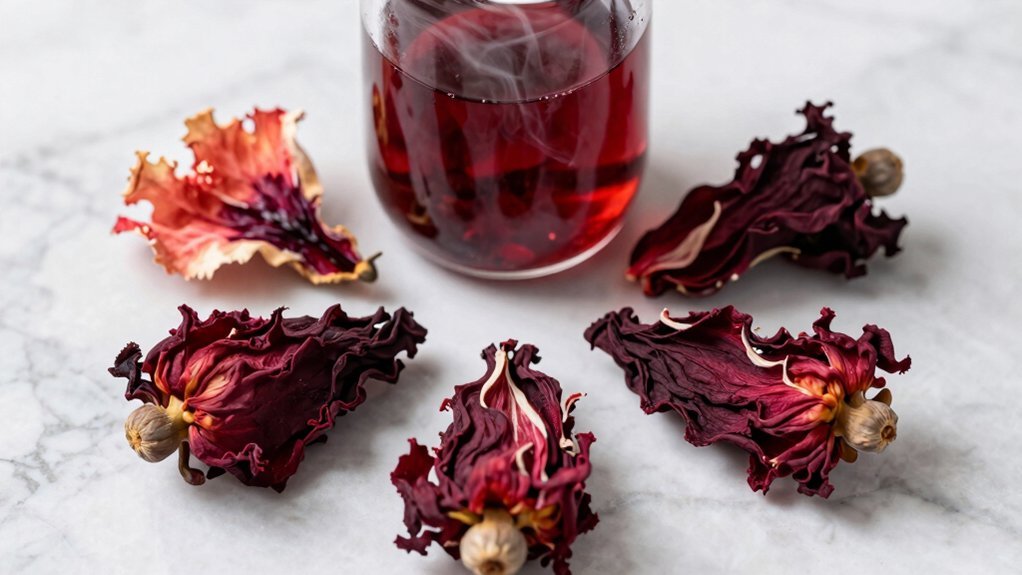


Leave a Reply